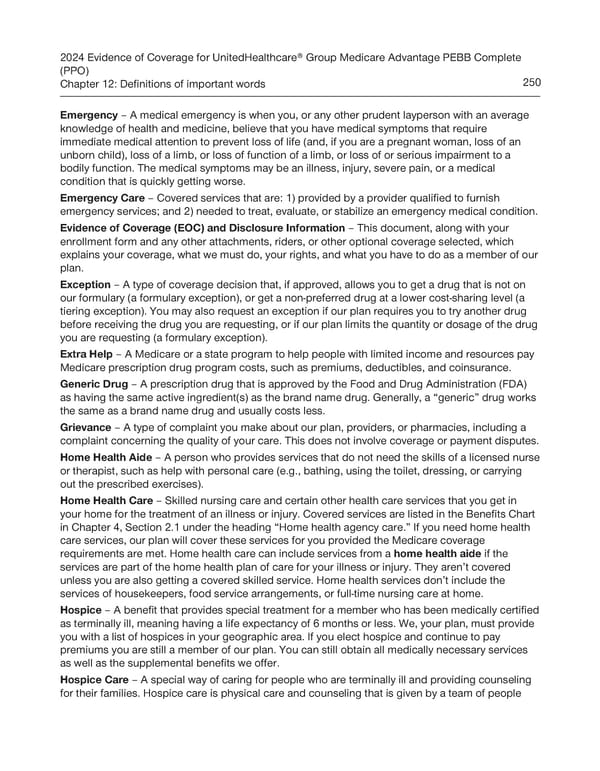2024 Evidence of Coverage for UnitedHealthcare® Group Medicare Advantage PEBB Complete (PPO) Chapter 12: Definitions of important words 250 Emergency – A medical emergency is when you, or any other prudent layperson with an average knowledge of health and medicine, believe that you have medical symptoms that require immediate medical attention to prevent loss of life (and, if you are a pregnant woman, loss of an unborn child), loss of a limb, or loss of function of a limb, or loss of or serious impairment to a bodily function. The medical symptoms may be an illness, injury, severe pain, or a medical condition that is quickly getting worse. Emergency Care – Covered services that are: 1) provided by a provider qualified to furnish emergency services; and 2) needed to treat, evaluate, or stabilize an emergency medical condition. Evidence of Coverage (EOC) and Disclosure Information – This document, along with your enrollment form and any other attachments, riders, or other optional coverage selected, which explains your coverage, what we must do, your rights, and what you have to do as a member of our plan. Exception – A type of coverage decision that, if approved, allows you to get a drug that is not on our formulary (a formulary exception), or get a non-preferred drug at a lower cost-sharing level (a tiering exception). You may also request an exception if our plan requires you to try another drug before receiving the drug you are requesting, or if our plan limits the quantity or dosage of the drug you are requesting (a formulary exception). Extra Help – A Medicare or a state program to help people with limited income and resources pay Medicare prescription drug program costs, such as premiums, deductibles, and coinsurance. Generic Drug – A prescription drug that is approved by the Food and Drug Administration (FDA) as having the same active ingredient(s) as the brand name drug. Generally, a “generic” drug works the same as a brand name drug and usually costs less. Grievance – A type of complaint you make about our plan, providers, or pharmacies, including a complaint concerning the quality of your care. This does not involve coverage or payment disputes. Home Health Aide – A person who provides services that do not need the skills of a licensed nurse or therapist, such as help with personal care (e.g., bathing, using the toilet, dressing, or carrying out the prescribed exercises). Home Health Care – Skilled nursing care and certain other health care services that you get in your home for the treatment of an illness or injury. Covered services are listed in the Benefits Chart in Chapter 4, Section 2.1 under the heading “Home health agency care.” If you need home health care services, our plan will cover these services for you provided the Medicare coverage requirements are met. Home health care can include services from a home health aide if the services are part of the home health plan of care for your illness or injury. They aren’t covered unless you are also getting a covered skilled service. Home health services don’t include the services of housekeepers, food service arrangements, or full-time nursing care at home. Hospice – A benefit that provides special treatment for a member who has been medically certified as terminally ill, meaning having a life expectancy of 6 months or less. We, your plan, must provide you with a list of hospices in your geographic area. If you elect hospice and continue to pay premiums you are still a member of our plan. You can still obtain all medically necessary services as well as the supplemental benefits we offer. Hospice Care – A special way of caring for people who are terminally ill and providing counseling for their families. Hospice care is physical care and counseling that is given by a team of people
 UnitedHealthcare PEBB Complete EOC (2024) Page 255 Page 257
UnitedHealthcare PEBB Complete EOC (2024) Page 255 Page 257